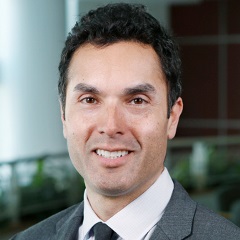Physician Burnout
 By Patrick Larreategui, DO, FACOS, medical staff president, Upper Valley Medical Center
By Patrick Larreategui, DO, FACOS, medical staff president, Upper Valley Medical Center
The medical staff at Upper Valley Medical Center, along with physicians throughout Premier Health, recently participated in the Ohio Hospital Association’s physician burnout study. Of the 269 Premier Health physicians who completed the survey, 54.3 percent reported being at or near burnout, compared to 56.3 percent statewide. Employed physicians had a slightly higher rate of burnout compared to private physicians.
Physician burnout presents as a cluster of symptoms, such as fatigue, exhaustion, cynicism, decreased productivity, and feeling a lack of personal accomplishment. More than half of all physicians suffer from at least one of these symptoms. Unfortunately, burnout is often attributed to a lack of resilience and resourcefulness on the part of the physician. This characterization of physicians suffering from burnout is simply not true. Physicians are highly motivated, resilient people who have entered the field of medicine with the desire to help people. They have sacrificed normal lives to make it through years of medical training. They endure lost sleep, family strain, financial instability, and often disregard for their own personal health.
Physician burnout is the inevitable consequence of the current health care system in which physicians retain all the responsibility of caring for patients but are slowly being stripped of authority regarding how that care is delivered. Clinical guidelines, electronic medical records, patient satisfaction scores, quality metrics, and the constant threat of litigation all weigh heavily on physicians’ clinical decision making. More and more physicians are employed by health care systems, thus losing autonomy regarding how their practices are managed. The daily grind of modern health care is emotionally exhausting. Suicide rates among physicians are not only now twice that of active duty military members; physicians have the highest suicide rate of any profession.
Collaborative efforts between physicians and health system administrative leaders to improve communication is a good first step in working toward a solution. Michael Gelbart, MD, president-elect of the UVMC medical staff, is forming a physician counsel to encourage dialogue between physician leaders and administration. The group will discuss many challenges facing physicians today, without the constraints, rules, and formality of other established committees.
Ultimately, physicians need to regain autonomy in how they care for patients. Physicians must be regarded as more than providers of call coverage. Senior physicians should be treated with respect and loyalty for their years of service; not as depreciating assets as they age. And health care leaders need to recognize that physician wellness correlates with patient wellness – because happy physicians deliver high-quality, compassionate care.
Back to the December 2018 issue of Premier Pulse

